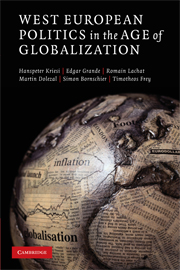Book contents
- Frontmatter
- Contents
- List of figures
- List of tables
- Preface and acknowledgments
- Part I Theory and methods
- Part II Country studies
- 4 France: the model case of party system transformation
- 5 Austria: transformation driven by an established party
- 6 Switzerland: another case of transformation driven by an established party
- 7 The Netherlands: a challenge that was slow in coming
- 8 The United Kingdom: moving parties in a stable configuration
- 9 Germany: the dog that didn't bark
- Part III Comparative analyses
- Appendix A Technical appendix
- Appendix B Detailed statistical results
- References
- Index
5 - Austria: transformation driven by an established party
Published online by Cambridge University Press: 05 September 2012
- Frontmatter
- Contents
- List of figures
- List of tables
- Preface and acknowledgments
- Part I Theory and methods
- Part II Country studies
- 4 France: the model case of party system transformation
- 5 Austria: transformation driven by an established party
- 6 Switzerland: another case of transformation driven by an established party
- 7 The Netherlands: a challenge that was slow in coming
- 8 The United Kingdom: moving parties in a stable configuration
- 9 Germany: the dog that didn't bark
- Part III Comparative analyses
- Appendix A Technical appendix
- Appendix B Detailed statistical results
- References
- Index
Summary
Introduction
Austrian post-war politics until the 1980s was a classic example of stability. For almost forty years after 1945, either the Social Democrats (SPÖ) or the Christian Democrats (ÖVP) governed the country: from 1945 to 1966 together in a grand coalition, the type of government most often associated with Austria. From 1966 to 1983, first the ÖVP, then the SPÖ (1970–83), managed to achieve majorities of their own and built five consecutive single-party governments. Until the early 1980s, voters were extremely loyal to the major parties not least because they were not affected by several social and economic problems experienced in other European countries, such as mass unemployment, strikes and riots, which famously inspired Pope Paul VI to call Austria an ‘Island of the Blessed’.
Since the 1980s, Austria has experienced far-reaching developments: the breakdown of Austro-Keynesianism and nationalized industries led to important changes in macro-economic policy, because market forces have become accepted as a legitimate instrument for achieving growth (Lauber 1992: 170; Winckler 1988). The end of the communist regimes in neighbouring countries redeemed Austria from its status as a Western border state, but civil wars in the Balkans gave rise to almost forgotten fears for security and led to waves of refugees. EU membership was finally achieved in 1995, but quarrels about neutrality, the ‘sanctions’ against the government in 2000, and the opening of borders to East European workers gave rise to Euroscepticism.
- Type
- Chapter
- Information
- West European Politics in the Age of Globalization , pp. 105 - 129Publisher: Cambridge University PressPrint publication year: 2008



